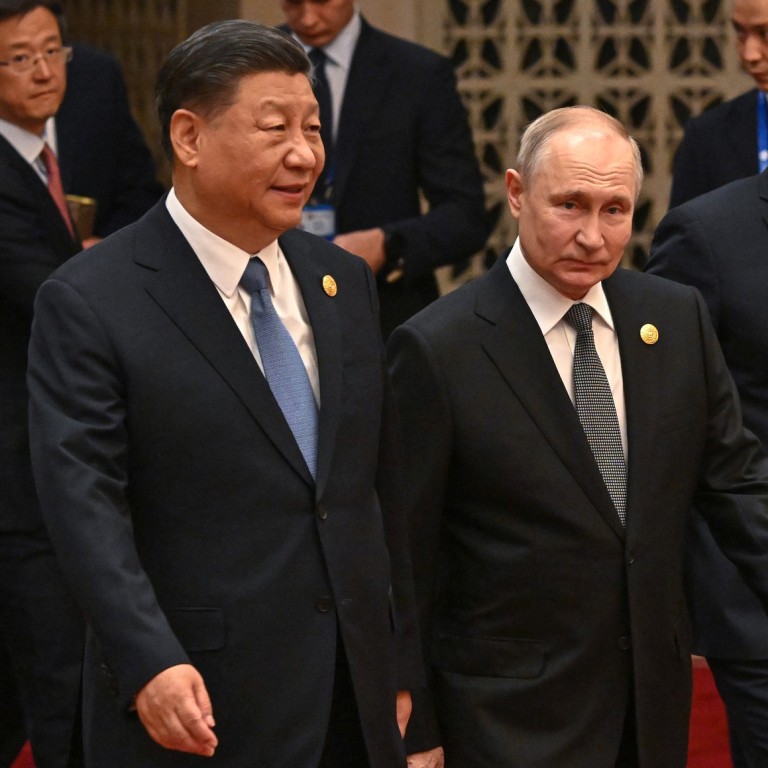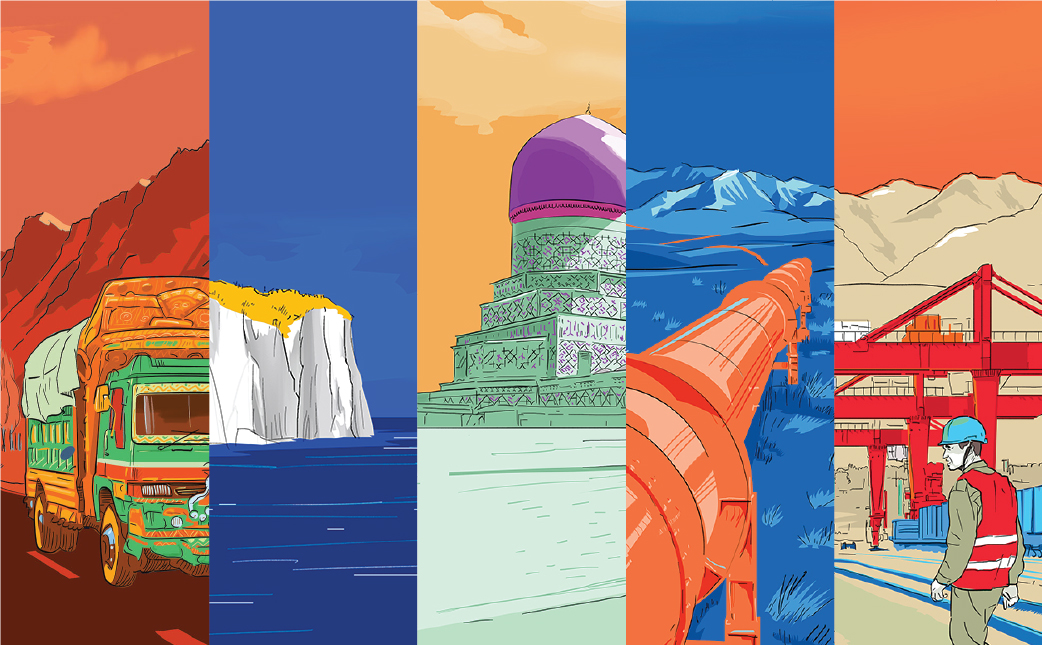Nan Yang
SENIOR MEMBER

- Joined
- May 1, 2010
- Messages
- 5,252
- Reaction score
- 1
- Country
- Location

President Xi Jinping (left) and Russian President Vladimir Putin head to a group photo session during the Belt and Road Forum in Beijing on October 18. Representatives from more than 130 countries attended the forum. Photo: dpa
China’s focus on peaceful development in stark contrast to West’s war priorities
- While the US, Europe and Western media were distracted by Ukraine and Israel’s war in Gaza, China brought together leaders from the Global South to celebrate 10 years of the Belt and Road Initiative
- This showcased Beijing’s commitment to building infrastructure in the name of peace and development

David Dodwell
Published: 8:30pm, 22 Oct, 2023
Last week’s contrasts could not be more stark. While the United States, Europe and the Western media pushed the Ukraine war off the front pages to focus on the atrocities occurring in Israel and the Gaza Strip, dozens of leaders from the Global South gathered at the Belt and Road Forum in Beijing to join President Xi Jinping and Russian President Vladimir Putin to focus on trade, investment, economic development and infrastructure.
In the West, the short-termism and overriding obsession with national security was palpable, with all calculations focused on hard-stretched military budgets and supplies. In Beijing, the focus was on long-term economic development, reducing poverty and multilateral cooperation. It reflected a sharp global decoupling, but not as many in the West have conceived it. Both were “de-risking”, but they reflected sharply differing conceptions of risk and how to deal with it.
For some in the West, Xi’s celebration of the 10th anniversary of the belt and road strategy and the densely detailed outline of infrastructure-building priorities for the decade ahead was not newsworthy. For the cynical among them, it was dismissed as a not-so-subtle, self-serving assertion of Chinese soft power. For the conspiracy theorists, it was noteworthy only as evidence of Sino-Russian plotting to reshape the global rules-based order.
Those who regard the Belt and Road Initiative as important and, on balance, of immense value are seen as naive and gullible. Be that as it may, here are the key points I took away from a busy and significant week in Beijing.
A 10-year audit: Uncomfortable as it might be to some, the initiative is reshaping the balance of global economic power. The steadily rising importance of the Global South is becoming clear, as is China’s role in shaping it and “sister” institutions such as the soon-to-be expanded Brics economies.
Chinese President Xi Jinping unveils 8-point vision for nation’s Belt and Road Initiative at forum
According to the International Monetary Fund, advanced economies accounted for 57.7 per cent of global GDP in 1992, while emerging markets accounting just 42.3 per cent. By 2023, this balance had flipped, with emerging economies rising to account for 58.9 per cent while advanced economies accounted for 41.1 per cent.
Whatever the disdain of naysayers and the numerous belt and road projects which have floundered or fallen short of expectations, there is infrastructure being built that might not otherwise have emerged. The economic prospects of many people in the developing world have improved as a result.
Infrastructure versus aid: The leadership in Beijing attributes much of its success during the past five decades to its single-minded commitment to improving all aspects of domestic infrastructure. If fellow economies in the developing world want to escape persistent poverty, they need good infrastructure, too.
They hold a conviction that Western aid in the past seven decades has been useless, and see building infrastructure as their gift to the developing world. They believe the initiative’s achievements vindicate their conviction. The fact that the Beijing meeting was attended by more than 130 representatives from countries that are home to belt and road projects suggests many in the developing world share that view.

Belt and Road Initiative
A visual explainer of the five main projects of the Belt and Road Initiative
Debt traps, disasters and wastefulness: Some in the West have held the initiative in disdain, arguing that Beijing’s main aim has been to offload its own spare industrial capacity, cajole developing economies into building white elephants and build dependency by stealth. To be sure, there have been failures, waste, delays and problems with corruption.
Even so, the view of those from the Global South gathered in Beijing last week is that the initiative has brought more good than harm. Last week’s focus on improving transparency, tightening project oversight, building institutions and focusing more on smaller, more sustainable projects suggests a willingness to learn from mistakes.
The definition of infrastructure is broadening, and priorities are evolving: Last week’s white paper made it clear that China’s definition of infrastructure is no longer limited to ports, roads, railways, power plants and other “hard” infrastructure. It includes developing hi-tech capabilities, 5G, artificial intelligence and even tourism infrastructure. Given the massive risks linked with big, long-gestation infrastructure projects, expect a focus on smaller projects that can be completed quickly.
The initiative competes with Western infrastructure-building initiatives: The idea that the Belt and Road Initiative competes with anything is nonsense. The Asian Development Bank estimated in 2017 that, in Asia alone, the shortfall in infrastructure investment amounted to around US$900 billion a year. In short, the desperate need is for more and better infrastructure, delivered as quickly as possible and from as many sources as possible.
https://www.scmp.com/economy/china-...urity-western?module=hard_link&pgtype=article
Russia and China are undermining the global rules-based order: China has a 4,200km border with Russia. Whatever Beijing’s honest view of Putin’s Russia, its interest is in maintaining stable relations. China needs the timber and minerals that sit in Siberia to its north, and it needs access to the Arctic coastline that global warming has made accessible. Realpolitik means Moscow must be kept on friendly terms.The initiative is an extension of China’s soft power which lures developing economies into dependency: The strategy is intended to cement friendships in strategically important regions, but Beijing’s conviction is that the gains from its projects flow in all directions.
Without mentioning the US directly, Xi noted last week that viewing others’ development as a threat, or taking economic interdependence as a risk, will not improve one’s own life or speed up one’s development. Maybe there are lessons in Gaza to be learned from that.
David Dodwell is CEO of the trade policy and international relations consultancy Strategic Access, focused on developments and challenges facing the Asia-Pacific over the past four decades

David Dodwell
David Dodwell is the executive director of the Hong Kong-APEC Trade Policy Study Group, a trade policy think tank.
